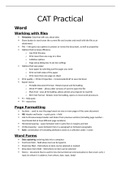Summary
Summary of Grade 11 Computers, Part of Your Life - Computer Applications Technology (PRACTICAL ONLY)
- Course
- Institution
- Book
My Grade 11 CAT Notes provide comprehensive coverage of all the material in the Study Opportunities CAT textbook while condensing the material into a much more manageable format. These notes include everything needed to pass with a distinction. NOTE: These notes contain the practical only. For note...
[Show more]




